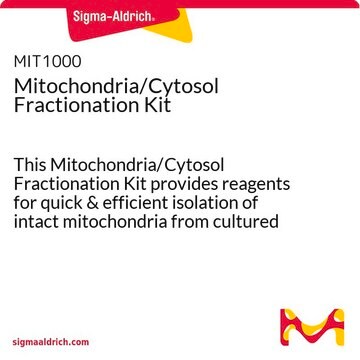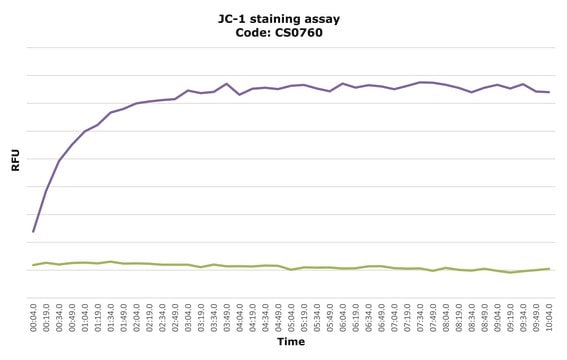MITOISO3
Yeast Mitochondria Isolation Kit
sufficient for 40 applications (using 20 OD culture preparations), isolation of an enriched mitochondrial fraction from yeast cells
About This Item
Productos recomendados
Quality Level
usage
sufficient for 40 applications (using 20 OD culture preparations)
storage temp.
−20°C
General description
Application
Features and Benefits
• The kit contains all the reagents required for a fast and easy yeast cell wall lysis by lyticase (spheroplast formation) followed by cell membrane lysis/breakage and mitochondria isolation
• The kit provides two alternatives for cell membrane disruption. The first one by a detergent and second one by homogenization.
• The kit includes an extraction buffer for mitochondrial protein profiling to be used in proteome studies
• The kit includes a storage buffer for use with intact mitochondria.
• The reagents are sufficient for 40 procedures using 20 OD culture preparations
• The kit was tested on Saccharomyces cerevisiae, Pichia pastoris, and Schizosaccharomyces pombe
Los componentes del kit también están disponibles por separado
related product
signalword
Danger
Hazard Classifications
Acute Tox. 4 Oral - Aquatic Acute 1 - Aquatic Chronic 1 - Carc. 2 - Eye Dam. 1 - Repr. 2 - Resp. Sens. 1 - Skin Irrit. 2 - STOT RE 2
Storage Class
10 - Combustible liquids
Certificados de análisis (COA)
Busque Certificados de análisis (COA) introduciendo el número de lote del producto. Los números de lote se encuentran en la etiqueta del producto después de las palabras «Lot» o «Batch»
¿Ya tiene este producto?
Encuentre la documentación para los productos que ha comprado recientemente en la Biblioteca de documentos.
Los clientes también vieron
Artículos
Cellular oxidative stress is countered by enzymatic scavengers and antioxidant modulators against reactive oxygen species damage.
Cellular oxidative stress is countered by enzymatic scavengers and antioxidant modulators against reactive oxygen species damage.
Cellular oxidative stress is countered by enzymatic scavengers and antioxidant modulators against reactive oxygen species damage.
Cellular oxidative stress is countered by enzymatic scavengers and antioxidant modulators against reactive oxygen species damage.
Nuestro equipo de científicos tiene experiencia en todas las áreas de investigación: Ciencias de la vida, Ciencia de los materiales, Síntesis química, Cromatografía, Analítica y muchas otras.
Póngase en contacto con el Servicio técnico











